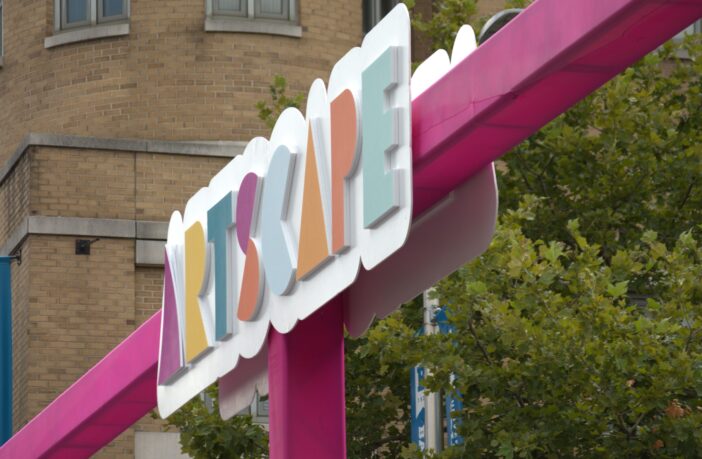The Baltimore Office of Promotion and the Arts (BOPA) has concerns about the city’s plan to terminate its contract with the quasi-government agency within 90 days. The organization released a statement on Oct. 18, relaying the risk a rushed transition poses to the future of the organization and local arts community. BOPA is responsible for putting on major events such as the Baltimore Book Festival and the largest free arts festival in the country, Artscape. (AFRO Photo / Alexis Taylor)
By Megan Sayles
AFRO Business Writer
msayles@afro.com
The Baltimore Office of Promotion and the Arts (BOPA) has issued a statement following city officials’ decision to terminate their contract with the arts and culture organization. BOPA raised concerns about the city’s plan to transition the quasi-government agency’s services in just 90 days and the risk it poses to the local arts community.
The response came on Oct. 18, two days after the Baltimore City Mayor’s Office sent a letter to the organization, relaying its intent to cut ties as a result of BOPA’s financial instability.
“We want to be transparent with you, our valued stakeholders, about the steps we have taken to ensure the organization’s stability and future success,” wrote BOPA leadership in the statement. “We also want to be clear about the concern we hold for how the decision to terminate the contract, without a clear plan of how to manage a 90-day transition, places our organization and the arts community at extreme risk.”
In the Oct. 16 letter sent to BOPA, Marvin James, chief of staff for Mayor Brandon M. Scott, explained that the organization’s financial instability cast doubt about its ability to meet obligations to the city and local arts community.
Mayor Scott said in a statement that “ending the city’s contractual relationship with BOPA is not a decision taken lightly.”
“We are taking this step after deep and careful consideration following several years of turmoil within the organization,” he said.
BOPA had already been in talks with the officials within the Scott Administration since the organization’s cash troubles became public in recent months.
“Members of our executive committee met with the Mayor’s Office and left with the understanding that the city no longer desired to continue its relationship with BOPA in its current form, largely due to public discussion surrounding our finances,” wrote BOPA in the statement. “We acknowledged that some elements of the city contract put a strain on stabilizing the organization, and we agreed a transition of services would be necessary. However, we explained that our cash position could be resolved if the city released payments aligned with the timing of our expenses, noting that the current quarterly payment structure was a contributing factor.”
Hours before the Mayor’s Office sent the termination letter to BOPA, the organization held a board meeting, which ended in votes to execute layoffs and establish a transition taskforce to reassess the contract. In the statement, BOPA said during the meeting, it presented a balanced cash flow through the end of its contract term in June, which demonstrated a “proper” payment cycle and settled overdue receipts.
The organization said it was alarmed by the timing of the city’s cancellation notice.
“We are concerned by the timing of the city’s notification just hours after our board approved a responsible path forward, a path that was approved by the mayor’s representatives on our board,” said BOPA in the statement. “This reduces what could have been a productive and responsible 8-month transition to 90 days—without any indication of a plan on how to maintain the services provided by BOPA— places the arts community at significant risk and impacts the interim board’s ability to support a healthy transition in their volunteer capacity.”
BOPA is charged with producing a number of Baltimore’s top events, including Artscape, the Baltimore Book Festival and Martin Luther King (MLK) Jr. Day parade. It is also one of the main sources of funding and support for local creatives in the city, as it routinely deploys grants to artists and organizations.
BOPA has encountered significant financial challenges in recent years. According to federal tax filings, the organization held more than $5.8 million in net assets in 2019. By 2022, after years of canceling events due to the public health emergency engendered by the COVID-19 pandemic, that number declined to $1.5 million.
Its former leader, Donna Drew Sawyer, also publicly clashed with Mayor Brandon M. Scott in January 2023 following the organization’s attempt to cancel the MLK Jr. parade. She stepped down from her post after Scott told the board he lost confidence in her ability to lead the organization.
Rachel D. Graham, former director of external relations for the Reginald F. Lewis Museum of Maryland African American History and Culture, was named CEO in February 2024. She officially stepped into the role on March 15. BOPA also acquired a new interim board, which included representatives from the Mayor’s Office in March.
The new leadership was charged with understanding the organization’s cash position and devising a long-term strategy for fiscal sustainability. This included hiring an outside accounting firm to review BOPA’s financials dating back to 2019.
The cancellation of BOPA’s contract is subject to approval by the Baltimore City Board of Estimates on Nov. 6. If approved, BOPA will lose its quasi-government status but continue to operate as a private nonprofit organization.



